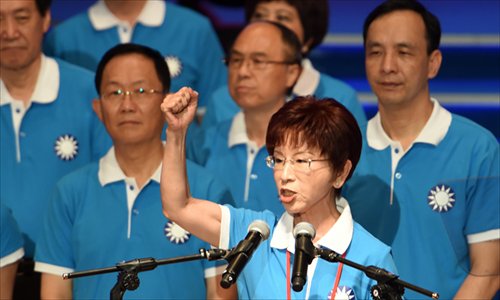Taiwan likely to elect first female leader
Taiwan parties look to women outside political dynastie

Hung Hsiu-chu, the Kuomintang (KMT) "presidential" candidate, gestures during the KMT's party congress in Taipei on Sunday. Taiwan's ruling KMT party officially endorsed Hung Hsiu-chu to run for "president" next year, as the deeply divided party faces a battle to regain public support. Photo: AFP
Taiwan's ruling Kuomintang (KMT) party on Sunday officially nominated Hung Hsiu-chu as its "presidential" candidate to compete against another female opposition candidate in the 2016 election, meaning the island is very likely to embrace its first female leader.
Experts said this first-ever election between two female candidates, both of whom come outside of political dynasties, will break the male-dominated political tradition in the region.
Hung, 67, deputy head of the island's "legislature," was endorsed at a KMT party congress on Sunday afternoon.
The opposition Democratic Progressive Party (DPP) has endorsed its chairwoman, Tsai Ing-wen, to run in the 2016 Taiwan election.
"Never hand over Taiwan to a political party that runs the country with lies and populism and has even never taken a hard look at itself or made apologies," Hung said, referring to the DPP government led by Chen Shui-bian from 2000 to 2008, Taiwan's Central News Agency reported on Sunday.
Chen is on medical parole from a lengthy sentence for corruption during his presidency.
"The contest between Hung and Tsai marks a new era in the Asia-Pacific region - a gradual normalization for women who have no familial connection with politics to enter politics," Wang Jianmin, a research fellow with the Taiwan Research Institute of the Chinese Academy of Social Sciences, told the Global Times.
There have already been a number of female Asian leaders, such as late Pakistani Prime Minister Benazir Bhutto, former president of the Philippines Gloria Macapagal Arroyo, and currently, President Park Geun-hye of South Korea, all of whom thrived on their family's political legacies, he said.
However, the two Taiwan candidates lack such advantages, he said.
Hung's father was a political prisoner and victim of the KMT's political persecution in the 1950s. Tsai's father was a wealthy businessman.
"They stood out because of high social tolerance in Taiwan that allows any competent candidate to run, regardless of their gender," Zhang Wensheng, a research fellow at Taiwan Research Institute of Xiamen University, told the Global Times.
"In turn, women's enthusiasm for devoting themselves to public service has been on the rise," Wang said, citing incumbent Kaohsiung mayor Chen Chu and former "vice-president" Annette Lu Hsiu-lien as examples.
However, Zhang noted that difficulties remain for a woman in pursuing a political career, given that all the politicians mentioned above are single and childless.
Other candidates are also set to enter the race, but Hung and Tsai are currently the two major contenders, with Tsai the clear favorite.
According to the latest poll released by Taiwan Brain Trust thinktank on Sunday, Tsai has 54.2 percent support while Hung is at 24.6 percent. If the People First Party nominates its chairman, James Soong Chu-yu, as its preferred candidate, the support rates for Tsai, Hung and Soong would be 43.8, 21.6 and 21.7 percent, respectively, the China Times reported.
Observers said that cross-Straits relations will make more progress if Hung is elected as regional leader, considering she has a more proactive approach to cross-Straits ties than the incumbent "president" Ma Ying-jeou.
Hung has a pro-unification stance while Ma adopted equivocal expressions that proclaimed a "three no" policy to deal with cross-Straits relations - no unification, no independence and no use of force, Wang said.
"Ma and the incumbent KMT chairman Eric Chu Li-luan have dodged core disputes with the Chinese mainland, but Hung is willing to discuss the issues, attempting to narrow differences," Zhang said, stressing that her clearer stance will further promote cross-Straits relations.
Ma reiterated the importance of the 1992 Consensus at the congress Sunday, AFP reported. "We must do everything we can to safeguard the 1992 Consensus, which has become the most critical source of stability over the past seven years," he said.
The 1992 Consensus, which centers on the concept of One China, is the framework and foundation for cross-Straits interaction.